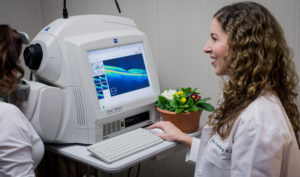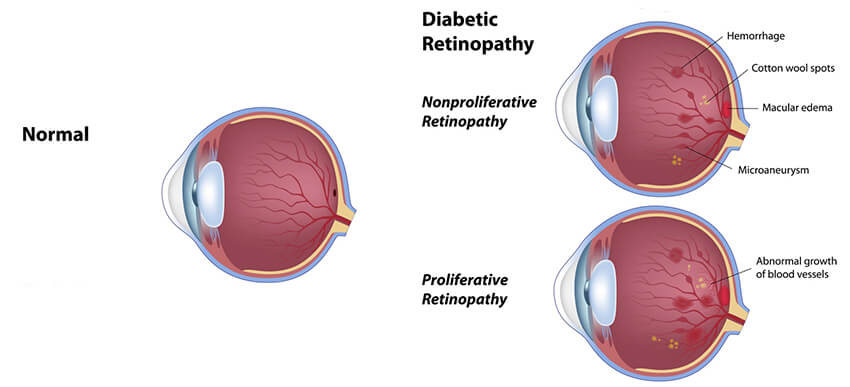Diabetes and the Eye
 If you have diabetes mellitus, your body does not use and store sugar properly. Over time, diabetes can damage blood vessels in the retina, the nerve layer at the back of the eye that senses light and helps send images to the brain. The damage to retinal vessels is referred to as diabetic retinopathy. Background retinopathy is an early stage of diabetic retinopathy. In this stage, tiny blood vessels within the retina leak blood or fluid. The leaking fluid causes the retina to swell or to form deposits called exudates.
If you have diabetes mellitus, your body does not use and store sugar properly. Over time, diabetes can damage blood vessels in the retina, the nerve layer at the back of the eye that senses light and helps send images to the brain. The damage to retinal vessels is referred to as diabetic retinopathy. Background retinopathy is an early stage of diabetic retinopathy. In this stage, tiny blood vessels within the retina leak blood or fluid. The leaking fluid causes the retina to swell or to form deposits called exudates.
Many people with diabetes have mild background diabetic retinopathy, which usually does not affect their vision. When vision is affected, it is the result of macular edema (swelling) or macular ischemia (loss of blood supply). Swelling is caused by fluid leaking from retinal blood vessels. It is the most common cause of visual loss in diabetics. Vision loss may be mild to severe, but even in the worst cases, peripheral (side) vision continues to function. Laser treatments or injections can be used to help control vision loss from macular edema, which can be performed in our office. Vascular ischemia occurs when capillaries (small blood vessels) close. Vision blurs because the macula no longer receives sufficient blood supply to work properly. Unfortunately, there is no effective treatment for macular ischemia.
Diabetic retinopathy can affect patients with both Type 1 (juvenile-onset) and Type 2 (adult-onset) diabetes. Younger diabetics are usually free of retinopathy for at least the first 5 years after the onset of the diabetic condition. Adults may develop retinopathy at any time after the diagnosis is made. Routine eye examinations are critical for early diagnosis and treatment. We now have more to offer diabetics than ever before. Most do well, and vision can be preserved in the majority of patients, but cooperation with regular eye examinations is needed to control the disease.

At Greenberg Laser Eye Center, we utilize the most advanced retinal care technology available. Even if you are not having symptoms of diabetic retinopathy, all diabetic should have a yearly routine dilated eye exam with Dr. Greenberg. This exam can help detect early stages of diabetic retinopathy, and ensure prompt treatment when necessary to prevent permanent loss of vision.

